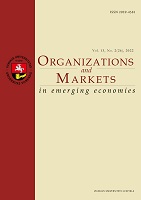Does Financial Inclusion Reduce Poverty in Niger State? Evidence from Logistic Regression Technique
Does Financial Inclusion Reduce Poverty in Niger State? Evidence from Logistic Regression Technique
Author(s): Nurudeen Abu, Musa Abdullahi Sakanko, Joseph David, Awadh Ahmed Mohammed Gamal, Ben ObiSubject(s): National Economy, Economic policy, Developing nations, Socio-Economic Research
Published by: Vilniaus Universiteto Leidykla
Keywords: poverty; financial inclusion; logistic regression method; Probit regression technique; Niger state;
Summary/Abstract: This study employs the logistic regression method to examine the effect of financial inclusion on the level of poverty in Niger State of Nigeria based on cross-sectional data randomly collected from 624 respondents across 224 towns and villages in 12 local government areas (LGAs) of the state. The estimation results illustrate that financial inclusion (proxied by bank account ownership, including access to bank, credit, and mobile phone) is significantly and negatively related to the level of poverty. This empirical outcome is further validated by the results of the Probit regression technique which show a significant negative relationship between financial inclusion and poverty in the state. Based on these empirical findings, the study recommends policies which include broadening bank coverage, softening credit requirements, and enhancement of people’s access to mobile phone and internet services in rural areas of Niger state.
Journal: Organizations and Markets in Emerging Economies
- Issue Year: 13/2022
- Issue No: 2
- Page Range: 443-466
- Page Count: 24
- Language: English

